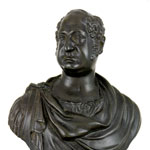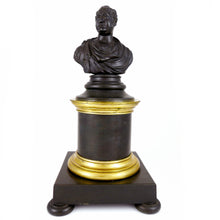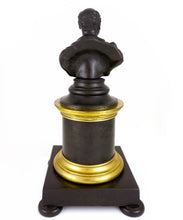A Bronze Mantel Bust Frederick, Duke of York, 1827
- Regular price
- £875
- Sale price
- £875
- Regular price
-
- Unit price
- /per
Adding product to your cart
Height: 29.5cm (11.75in)
Bronze. Portrayed quarter length in classical dress on a socle and mounted a bronze column and square base raised on four bun feet.
The Prince Frederick, Duke of York and Albany (1763-1827), was the second second son of George III, and from the death of his niece, Princess Charlotte of Wales in 1817, heir presumptive to his elder brother, King George IV. Sent into the Army by his father, he was gazetted colonel at seventeen. At twenty-one he was promoted lieutenant-general and appointed colonel of the Coldstream Guards. In the same year, 1788, he opposed Pitt's Regency Bill that attempted to deal with the crisis of the King's temporary madness by limiting the powers available to the Prince of Wales. Aged twenty-two Prince Frederick fought a duel on Wimbledon Common with an officer of his regiment who supported Pitt and to Frederick's mind had failed respond to an insult made at Daugbigny's gaming club in a manner becoming a gentleman.
Read more
Frederick was perpetually in debt because of his excessive gambling on cards and racehorses. When it came to the duel, his opponent fired first, the shot carrying away a lock of Frederick's hair. Nevertheless, Frederick refused to return fire whence honour was deemed to have been satisfied.
Frederick was promoted full General in 1793 and was appointed to high command in the Flanders campaign against the army of Revolutionary France. After his return to Britain he resolved to implement army reforms. In 1799 he commanded the main army in Anglo-Russian invasion of Holland but once again the campaign was beset with disasters including a shortage of supplies. Frederick was mocked, perhaps unfairly, in the rhyme 'The Grand Old Duke of York'. As Commander-in-Chief during the Napoleonic Wars, he reorganised the British Army, carrying through a massive programme of reform, and creating the force which served in the Peninsular War. He also oversaw preparations against Napoleon's planned invasion of the United Kingdom in 1803. However he was forced to resign as Commander-in-Chief when it was suggested that his latest mistress was illicitly selling army commissions under his aegis. In 1811 he was exonerated when it was revealed that his mistress had received payment from Frederick's disgraced chief accuser.
Frederick maintained a country residence at Oatlands near Weybridge, Surrey, where his estranged wife and cousin, Princess Frederica Charlotte of Prussia, spent much of her time. He was seldom there, preferring to immerse himself in his administrative work at Horse Guards and, after hours, at the gaming tables of St. James's.






